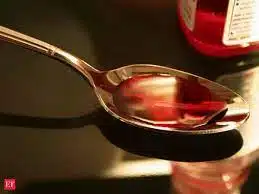On Tuesday, the Uzbek Ministry of Health reported that 18 children with acute respiratory illnesses had passed away after taking too much of the cough syrup Doc-1 Max made by the Indian company Marion Biotech. According to a statement from the Uzbek health ministry, the youngsters who died had taken cough medicine called Doc-1 Max from Noida-based Marion Biotech. India has opened an investigation into the accusations.
The cough syrup, which contains ethylene glycol, a chemical that shouldn’t be in cough syrup, was ingested in “extreme amounts” by the kids. Days prior, a parliamentary committee in The Gambia discovered “illegal quantities” of diethylene glycol and ethylene glycol in cough medicines produced by Maiden Pharma, a Haryana-based company.
In this case, acute kidney damage cases using cough syrups have been connected to at least 63 pediatric fatalities.

India has opened an investigation into the accusations
The ministry reported that the presence of ethylene glycol, a hazardous chemical, was discovered in a batch of syrups during laboratory testing. Additionally, it was alleged that the syrup was given to children at home in greater doses than advised without a doctor’s prescription, either by the children’s parents or on the advice of pharmacists. Before being sent to the hospital, the ministry claims that the kids had taken this syrup in quantities of 2.5 to 5 ml three to four times a day for two to seven days at home.
The Drugs Controller General, VG Somani, responded to the WHO by stating that tests on samples of Maiden’s products performed at government laboratories had “been confirmed to be consistent with norms” and that no dangerous chemicals had been discovered in them.
“To yet, consuming Doc-1 Max syrup has caused the deaths of 18 out of 21 infants with acute respiratory illness… It was discovered that the dead youngsters consumed 2.5–5 ml of the medication at home over 2–7 days, three or four times per day, exceeding the recommended dosage for kids. The medication was supplied to all kids without a doctor’s prescription.
Since paracetamol is the drug’s primary ingredient, Doc-1 Max syrup was improperly administered as an anti-cold medicine on the advice of the pharmacy salespeople, which is what caused the patients’ conditions to worsen.
Preliminary laboratory tests have revealed that the Doc-1 Max syrup in this series includes ethylene glycol. About 1-2 ml/kg of this chemical is hazardous. This drug is poisonous, and 1-2 ml/kg of a 95% concentrated solution can lead to significant health effects in the patient, including acute renal failure, fainting, convulsions, vomiting, and fainting.

The parents utilized the syrup for curing cold
In response to the deaths of 18 children, the statement claims that Doc-1 Max tablets and syrups are no longer available for purchase in any pharmacies nationwide. Seven employees were let go because they took too long to assess the situation and take the necessary steps.
It is known that teams from the Central Drugs Standard Control Organization (CDSCO – north zone) and the Uttar Pradesh Drugs Controlling and Licensing Authority are cooperating on the investigation.
The translation of the announcement from the Uzbek Health Ministry states, “Tablets and syrups of the medicine Doc-1 Max are withdrawn from sale in all pharmacies of the nation in a prescribed way.
The WHO issued a warning on October 5 associating four syrups to deaths in The Gambia, and as a result, Maiden Pharma’s export license has been stopped. India has countered that the WHO has created a “premature link” between the children’s deaths and the cough syrups produced there.
The pharmaceutical business reported that samples of the cough syrup were taken from its production facility and that they were awaiting the tests’ results. Uzbekistan was also asked for a report on the casualty assessment.

India-made cough syrups have been scrutinized twice in the past year. Cough medications made by Maiden Pharmaceuticals, located in Haryana, were blamed for the deaths of 70 children in the Gambia earlier this year. The Central Drugs Standard Control Organization closed its Sonepat facility in October due to a standard manufacturing infraction.
Before this, the WHO had said that a laboratory examination of Maiden cough syrup had revealed “unacceptable” levels of diethylene glycol and ethylene glycol, both of which are poisonous and can cause severe kidney impairment.













